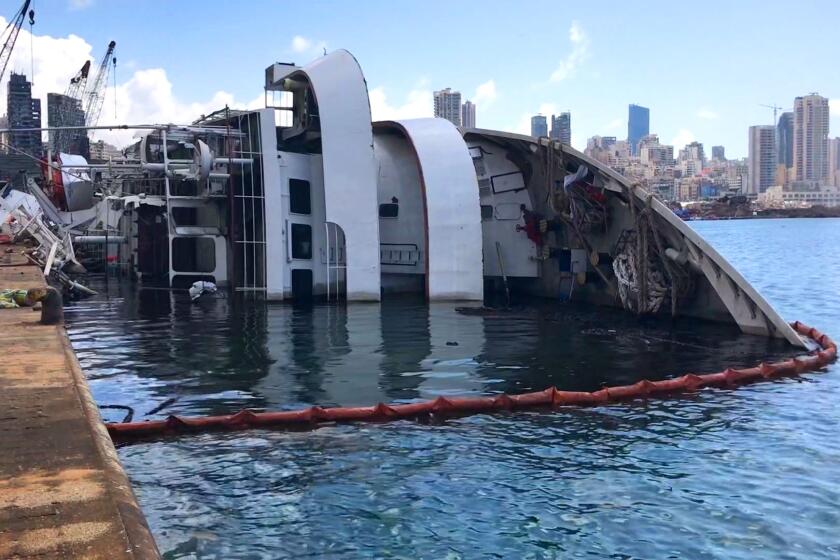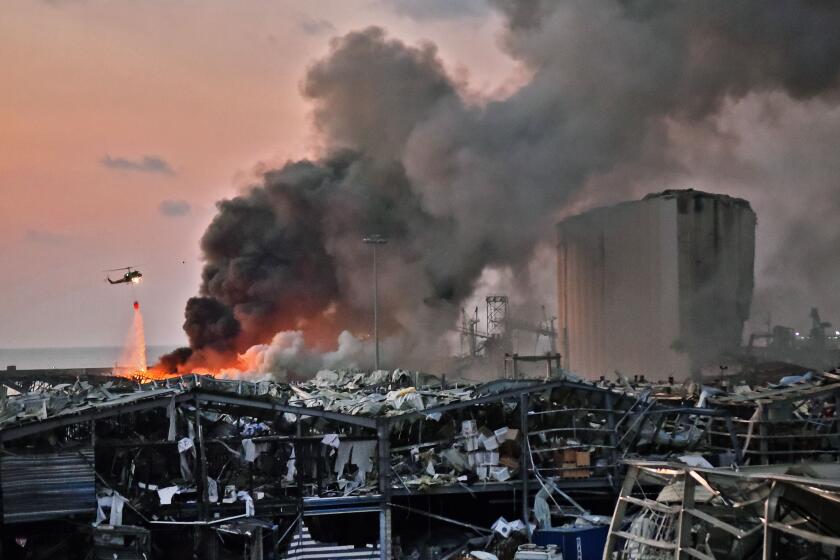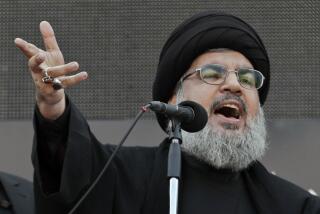1 Hezbollah member convicted, 3 acquitted in assassination of ex-Lebanese premier Rafik Hariri

LEIDSCHENDAM, Netherlands — A United Nations-backed tribunal on Tuesday convicted one member of the militant group Hezbollah and acquitted three others of involvement in the 2005 assassination of former Lebanese Prime Minister Rafik Hariri.
The Special Tribunal for Lebanon said Salim Ayyash was guilty, as a co-conspirator, of five charges stemming from his involvement in the suicide truck bombing that killed Hariri and 21 others in a huge blast outside a seaside hotel in Beirut on Feb. 14, 2005. The attack also wounded 226 people.
Three other Hezbollah members, however, were acquitted of all charges of involvement in the assassination, a brazen killing that sent shock waves through the Mideast.
All four defendants in the case were tried in absentia. Ayyash is not likely to serve any prison time because Hezbollah has vowed to not hand over any suspects.
The tribunal’s judges also said Tuesday there was no evidence that either the Hezbollah leadership or Syria was involved in the attack.
Hariri’s son Saad, also a former Lebanese prime minister, said that the family accepted the verdicts, which came after an investigation and trial spanning years. “Justice will be executed, regardless of how long it takes,” he said.
Two weeks after the Beirut blast, cleanup and investigative crews are still sifting through the rubble of leveled buildings and upended lives.
Sketching the complex political backdrop for the assassination, Presiding Judge David Re of the special tribunal said that in the months before his death, Hariri was a supporter of reducing the influence of Syria and Hezbollah in Lebanon.
He said judges who studied reams of evidence were “of the view that Syria and Hezbollah may have had motives to eliminate Mr. Hariri, and some of his political allies,” but that there was no evidence to prove their involvement.
The court was technically not tasked with ruling on either Hezbollah or Syria’s potential involvement — only on that of the four named Hezbollah suspects. But its conclusion of a lack of evidence tying Hezbollah’s leadership to the crime is good news for the Iran-backed militant group, which dominates Lebanese politics and has come under increased scrutiny and pressure at home.
The verdicts were delayed by nearly two weeks as a mark of respect for victims of another devastating explosion: the detonation of nearly 3,000 tons of ammonium nitrate stored at Beirut’s port. The Aug. 4 blast killed about 180 people, injured more than 6,000, left a quarter of a million with homes unfit to live in and plunged a nation already reeling from economic and social malaise even deeper into crisis.
Los Angeles Times reporter Nabih Bulos was less than 500 yards from the center of the massive explosion in Beirut. He lived to tell the tale
Re started the hearing with a minute’s silence to honor victims of that blast and their families as well as those made homeless.
He then read a summary of the written judgment in the Hariri case, which runs to more than 2,600 pages with about 13,000 footnotes.
The guilty verdict, though for only one of the four defendants, could compound tensions in Lebanon. Hariri was its most prominent Sunni Muslim politician at the time of his death, while Hezbollah is a Shiite Muslim group backed and funded by Tehran.
Prosecutors based their case largely on data from cellphones allegedly used by the plotters to plan and execute the bombing. Without the phone data there would be no case against the four suspects, Re noted, saying that the telecom evidence was “almost entirely circumstantial.”
Lebanese Prime Minister Saad Hariri has resigned, a victory for anti-government protesters. But now they face a new challenge in Hezbollah.
However, another judge, Janet Nosworthy, later said that judges had ruled that four different networks of cellphones “were interconnected and coordinated with each other, and operated as covert networks at the relevant times.”
During the trial, which started in 2014 and spanned 415 days of hearings, the tribunal in Leidschendam, near The Hague, heard evidence from 297 witnesses.
Initially, five suspects were tried, all of them Hezbollah members. Charges against one of the group’s top military commanders, Mustafa Badreddine, were dropped after he was killed in Syria in 2016. The court said Tuesday that it could not prove that Badreddine was the mastermind behind the assassination.
The remaining suspects were Ayyash, also known as Abu Salim; Assad Sabra; Hassan Oneissi, who changed his name to Hassan Issa; and Hassan Habib Merhi. They were charged with offenses including conspiracy to commit a terrorist act.
Lebanon’s state-run National News Agency is reporting that the country’s foreign minister has summoned the U.S. ambassador to Beirut over comments she made recently in which she criticized the militant Hezbollah group.
A hearing will be held at a later date to determine Ayyash’s sentence. Because the U.N.-backed court has no death sentence, the maximum sentence is life imprisonment.
Prosecutors and defense lawyers can appeal the verdicts.
The assassination was seen by many in Lebanon as the work of Syria, an allegation Damascus denies and which the judges now say was not borne out by evidence in the trial.
Some Lebanese see the tribunal as an impartial way of uncovering the truth about Hariri’s slaying, though Hezbollah calls it an Israeli plot to tarnish the group.
Abed Itani, a supporter of the Hariri family in Beirut’s Tariq al-Jadida neighborhood, said: “We have been waiting for the truth for 15 years, and God willing, today the truth will be made public. All that we want from the world and the Lebanese state is for those who carried out this explosion to be punished in accordance with justice.”
More to Read
Sign up for Essential California
The most important California stories and recommendations in your inbox every morning.
You may occasionally receive promotional content from the Los Angeles Times.














